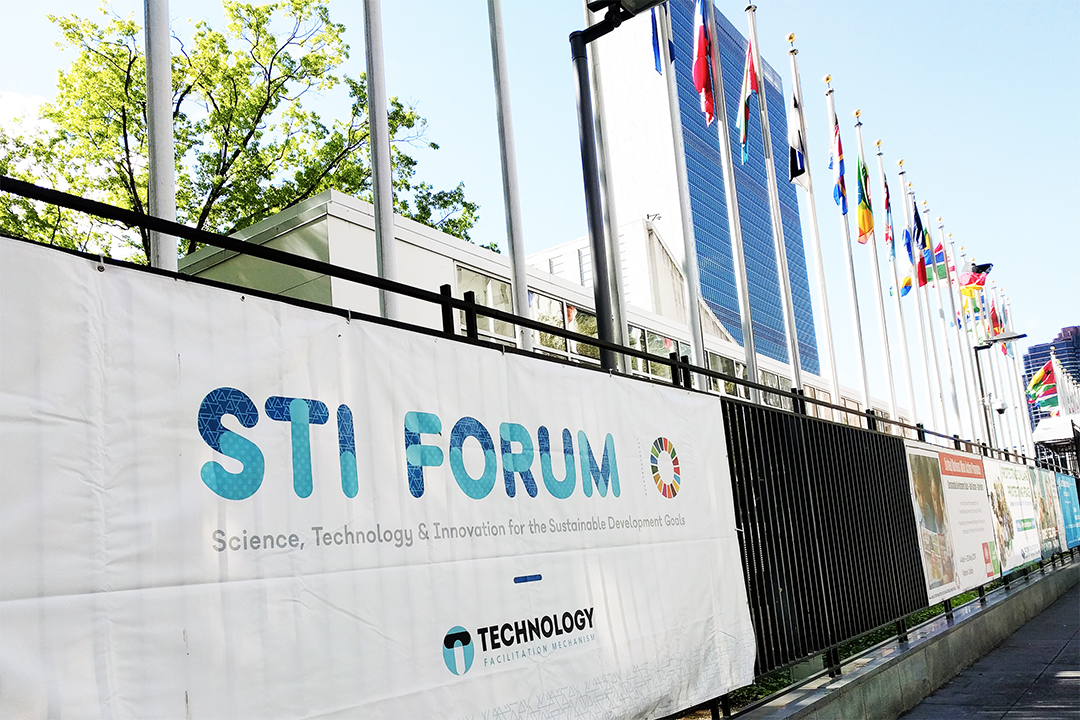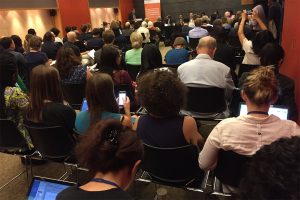15 May 2019: During the fourth annual meeting of the Multi-Stakeholder Forum on Science, Technology, and Innovation (STI) for the SDGs, also referred to as the STI Forum 2019, participants called for greater science-business connections to drive implementation, more resources and funding, operationalization of an online inventory of STI, and making the STI Forum a culmination of intersessional work.
The outcomes of the STI Forum 2019 will be summarized by its Co-Chairs and serve as inputs to the July 2019 session of the UN High-level Political Forum on Sustainable Development (HLPF).
The STI Forum is a component of the Technology Facilitation Mechanism (TFM) outlined in the Addis Ababa Action Agenda and the 2030 Agenda for Sustainable Development. The TFM also includes a UN Inter-Agency Task Team on STI for the SDGs (IATT), a 10-Member Group composed of non-UN experts, and an online platform that aims to serve as a gateway for information on existing STI initiatives, mechanisms, and programmes.
The 2019 session of the Forum addressed the theme, ‘STI for ensuring inclusiveness and equality.’ It convened from 14-15 May 2019, at UN Headquarters in New York, US, under the leadership of Elizabeth Thompson, Permanent Representative of Barbados, and Marie Chatardová, Permanent Representative of the Czech Republic, who served as Co-Chairs of the Forum. The Forum featured substantive panel discussions on the SDGs that will be reviewed at the upcoming session of the HLPF, namely SDGs 4 (quality education), 8 (decent work and economic growth), 10 (reduced inequalities), 13 (climate action) and 16 (peace, justice and strong institutions).
The panel discussions also addressed: emerging technology clusters and the impact of rapid technological change on the SDGs; cross-cutting issues such as youth, gender and indigenous peoples; and supporting implementation of the TFM. The Forum featured a Ministerial Segment that considered “strengthening capacity and policy for the development of STI roadmaps.”
Opening the Forum, UN Economic and Social Council (ECOSOC) President Inga Rhonda King called for stepping up efforts to leverage STI for the SDGs, noting that while STI is helping the world address global challenges, changes are not deep or fast enough to respond to those challenges.
Liu Zhenmin, head of the UN Department of Economic and Social Affairs (DESA), said 2019 is a special year as it completes the first cycle of the HLPF, and is an opportunity to reflect on lessons learned and the way forward. He noted that the TFM demonstrates a model of working together in the UN system, adding that 42 UN entities are part of the IATT. Among the TFM’s accomplishments, he highlighted the release of a draft ‘Guidebook for the Preparation of STI for SDGs Roadmaps,’ and the development of a prototype of the online platform to help connect providers of technology solutions to those who seek them. Liu further outlined the need for sustainable funding and partnership contributions for making further progress on the Mechanism.
Selected innovators gave ten 90-second presentations to the Forum. Kate Radford, Can’t Wait to Learn, Netherlands, introduced the concept of developing gaming technology for curriculum applications to be used globally, and lamented the millions of children who are either not learning in, or lack access to, school due to conflict. Anne K. Rweyora, A roof, A skill, and A market for Women, Uganda, described how this initiative is empowering women to become homeowners, using environmentally-friendly building materials to provide durable homes in order to leave no woman behind without decent shelter. Co-Chair Thompson noted that a rigorous process had been used to select finalists for the innovation presentations, and suggested that the next step in future iterations of the Forum might be to find financiers to fund the winners’ enterprises.
During a panel discussing the TFM’s implementation and the way forward, Macharia Kamau, Principal Secretary to the Ministry of Foreign Affairs, Kenya, congratulated the UN for keeping the momentum going on the Mechanism, and noted its relevance in bringing together Member States, the UN, the private sector, youth and other stakeholders. He stressed the importance of connecting science to business to drive implementation and countries’ development. He further remarked that governments must remain front and center in the STI and create incentives and enabling environments to drive science and technology.
Lynn St. Amour, Chair, Multi-stakeholder Advisory Group to the Internet Governance Forum (IGF), highlighted commonalities between the TFM and the IGF, which is entering its 14th year of work. She said the global IGF collaborates with local IGFs, which facilitates work on the ground, and prioritizes inclusiveness and access.
Joshua Phoho Setipa, Technology Bank for Least Developed Countries (LDCs), recalled that the Bank was established following a decision by the UN General Assembly (UNGA) in 2016, at the request of LDCs. He reported that the Bank is participating in the work of the IATT, and is undertaking STI reviews in countries in collaboration with the UN Conference on Trade and Development (UNCTAD) and the UN Educational, Scientific, and Cultural Organization (UNESCO). UNESCO said its actions are aligned with the work of the TFM, noting that it has launched the Global Observatory of Science, Technology, and Innovation Policy Instruments (GO-SPIN) platform.
One stakeholder suggested opening the STI Forum Co-Chairs’ Summary for comments before its submission to the HLPF. Other participants called for: bringing pilot projects to the attention of policy-makers; new legislation to stimulate innovative solutions; and innovative financing.
In closing, ECOSOC President King said the two days of “intense, informative discussions” demonstrated practical examples of STI for the SDGs, enabled discussion on cross-cutting issues, identified gaps and challenges in STI knowledge, capacity, and application, and discussed innovative science and technology solutions for addressing climate change and for promoting equitable societies in a rapidly changing world, among other topics. King said the TFM seeks to support cooperation among multiple stakeholders on STI for the SDGs, and expressed hope that it had inspired participants to connect. She remarked that the work of the TFM should be more than two days of discussion and should be seen as the yearly culmination of intersessional work.
In addition to side events, the meeting also featured: the launch of an exhibition on innovative technology solutions for SDGs, following a Global Call for Innovations; the launch of an exhibition on gender and STI; and a roundtable on STI roadmaps for the SDGs. [IISD Coverage of STI Forum 2019] [STI Forum 2019 Webpage] [UN Coverage of First Day of Forum] [UN Coverage of Second Day of Forum] [DESA Press Release]

